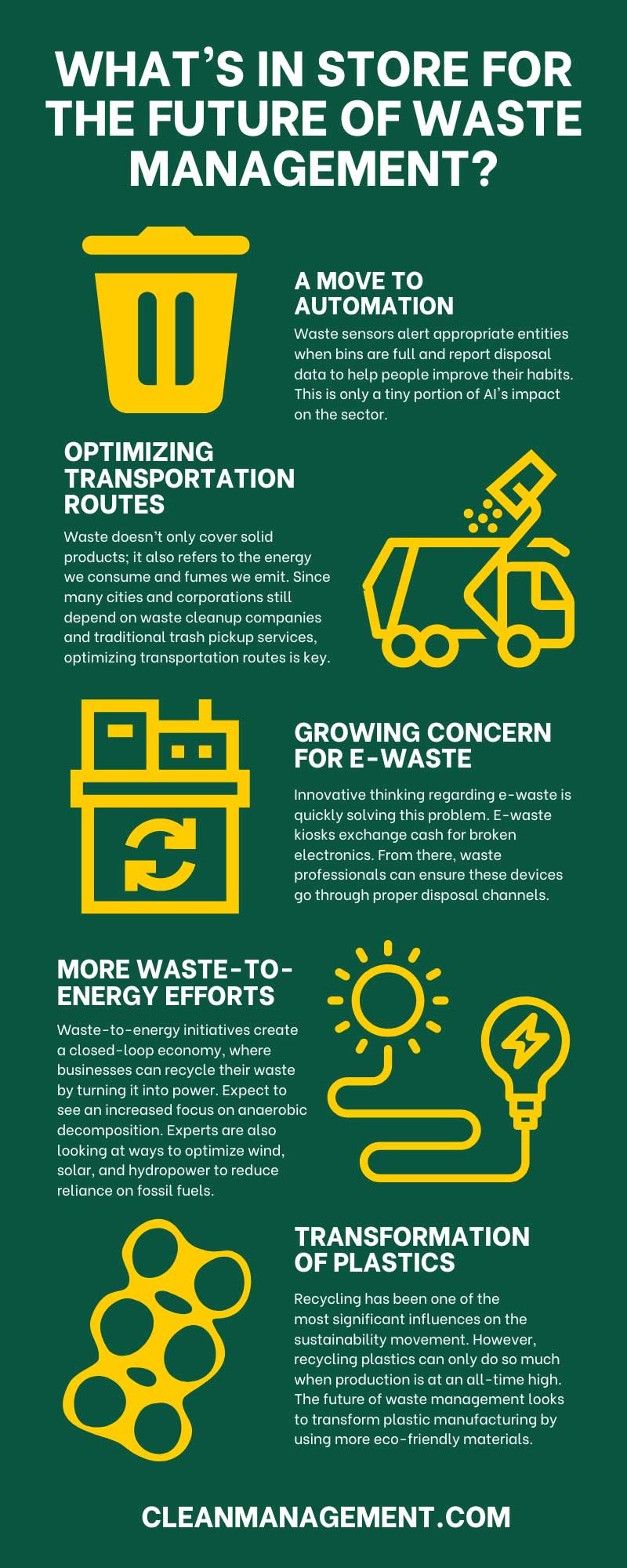What’s in Store for the Future of Waste Management?

As the global population continues to grow, more and more countries are experiencing a massive increase in waste production. This expansion poses a significant problem since the world has limited disposal sites. To add to the issue, other forms of destruction contribute to greenhouse gas emissions that exacerbate climate change.
Innovation is the only solution to the matter. Integrating technology, optimizing current practices, encouraging governmental involvement—we can expect all of these things to push waste management forward. Businesses that understand what’s in store for the future of waste management can get the upper hand.
Emphasis on Smart Waste Management
It’s no secret that the world has experienced a massive technological boom in the last 30 years. Nearly every industry embraced this change in one way or another. Going digital revolutionized how businesses communicate and keep records, allowing society to cut down on paper waste.
Still, there’s more work to do. Experts expect to see an emphasis on smart waste management practices. We’ve already seen this innovation making waves, and there’s no indication that technology will become obsolete in the future.
A Move to Automation
The waste management industry benefits from automation enormously. Recycling robots sort through garbage with ease, picking out repurposable products and keeping them out of landfills.
Waste sensors alert appropriate entities when bins are full and report disposal data to help people improve their habits. This is only a tiny portion of AI’s impact on the sector.
Optimizing Transportation Routes
Waste doesn’t only cover solid products; it also refers to the energy we consume and fumes we emit. Since many cities and corporations still depend on waste cleanup companies and traditional trash pickup services, optimizing transportation routes is key.
Dump trucks can take shorter routes to and from destinations through advanced satellite and GPS technology. This action results in fewer emissions and reduced fuel consumption, all of which raise sustainability grades.
Growing Concern for E-Waste
While digitization offers positive results, there are also a few drawbacks. Disposing of e-waste is complicated, and doing it incorrectly can have disastrous consequences.
Innovative thinking regarding e-waste is quickly solving this problem. E-waste kiosks exchange cash for broken electronics. From there, waste professionals can ensure these devices go through proper disposal channels.
More Waste-to-Energy Efforts
Converting waste into energy isn’t a new concept. However, further information regarding biological and chemical processes has renewed interest in developing new practices. Some incineration facilities already repurpose steam into energy. What does the future of waste-to-energy efforts look like?
Waste-to-energy initiatives create a closed-loop economy, where businesses can recycle their waste by turning it into power. Expect to see an increased focus on anaerobic decomposition. Experts are also looking at ways to optimize wind, solar, and hydropower to reduce reliance on fossil fuels.
Transformation of Plastics
Recycling has been one of the most significant influences on the sustainability movement. However, recycling plastics can only do so much when production is at an all-time high. The future of waste management looks to transform plastic manufacturing by using more eco-friendly materials.
Bioplastics are the most valuable player in this game. This term refers to biologically-based plastic instead of manufacturing from petroleum. Scientists are also researching ways to transform plastic into high-quality resin to reduce carbon emissions in the destruction process.
Push for Composting Initiatives
Waste disposal is largely dependent on three methods: landfill burial, incineration, and recycling. Future waste management plans will push for “greener” alternatives, such as composting. This method primarily targets food manufacturers and suppliers, since they contribute most to food waste.
Composting can create biofuels and reduce dependence on nonrenewable resources. It could also create a fresh revenue stream for businesses that cultivate and sell nutrient-rich soil from compost. This push is a game changer for the agricultural industry since commercial farms and ranches can slash costs by using their own by-products to enrich and improve crop production.
Wider Net for Government Participation
In the past, the most prominent champions of sustainability were non-profits and private businesses. Governmental involvement was spotty, depending on the state. At best, state-wide initiatives in progressive areas tried to make a difference in local communities.
In the future, waste forecasters expect more enthusiastic participation from the government at various levels. Improving communication between municipal waste collectors and their constituents will make disposal and reduction efforts clearer and more accessible. Since the government is supposed to reflect the wants and needs of its citizens, many predict an increase in governmental participation.
Optimization of the Packing Industry
Every single industry generates waste and contributes to the problem. Still, some are more culpable than others. Because of the nature of its work, the packing industry is guilty of adding to the issue tenfold.
The good news is that professionals in this sector are taking the future of waste management seriously. Moving towards biodegradable and recyclable packing supplies will reduce the amount of cardboard, paper, and plastic wasting away in landfills. Automated tracking software will reduce overproduction and allow companies to rely on recyclable alternatives.
Moving Away from Landfills
All of these advancements and alternatives help society move away from landfill dependence. Though experts take measures to improve landfill conditions, they continue to damage ecosystems. Reducing the number of landfills in the world gives the land back to plant and wildlife that keep the environment healthy.
Future plans see a decline in landfill use. It also encourages optimizing current locations to make them as harmless as possible. For example, the rise of geomembrane liners will help contain waste and keep it from invading surrounding habitats.
Why Should We Care About the Future of Waste Management?
Waste management isn’t the most glamorous topic. However, it plays a vital role in the advancement of our society. People should care about the future of waste management because it directly affects everyone’s quality of life.
Investing in future waste management improvements benefits the environment. This is the most obvious advantage and arguably the most important one. However, it also boosts the economy by creating more jobs and helping businesses save money. In turn, companies can reinvest in themselves and other endeavors, creating more cash flow.
The future of waste management is bright and exciting; Clean Management Environmental Group intends to be there every step of the way. If you want to be a part of this incredible innovation, contact us today!

